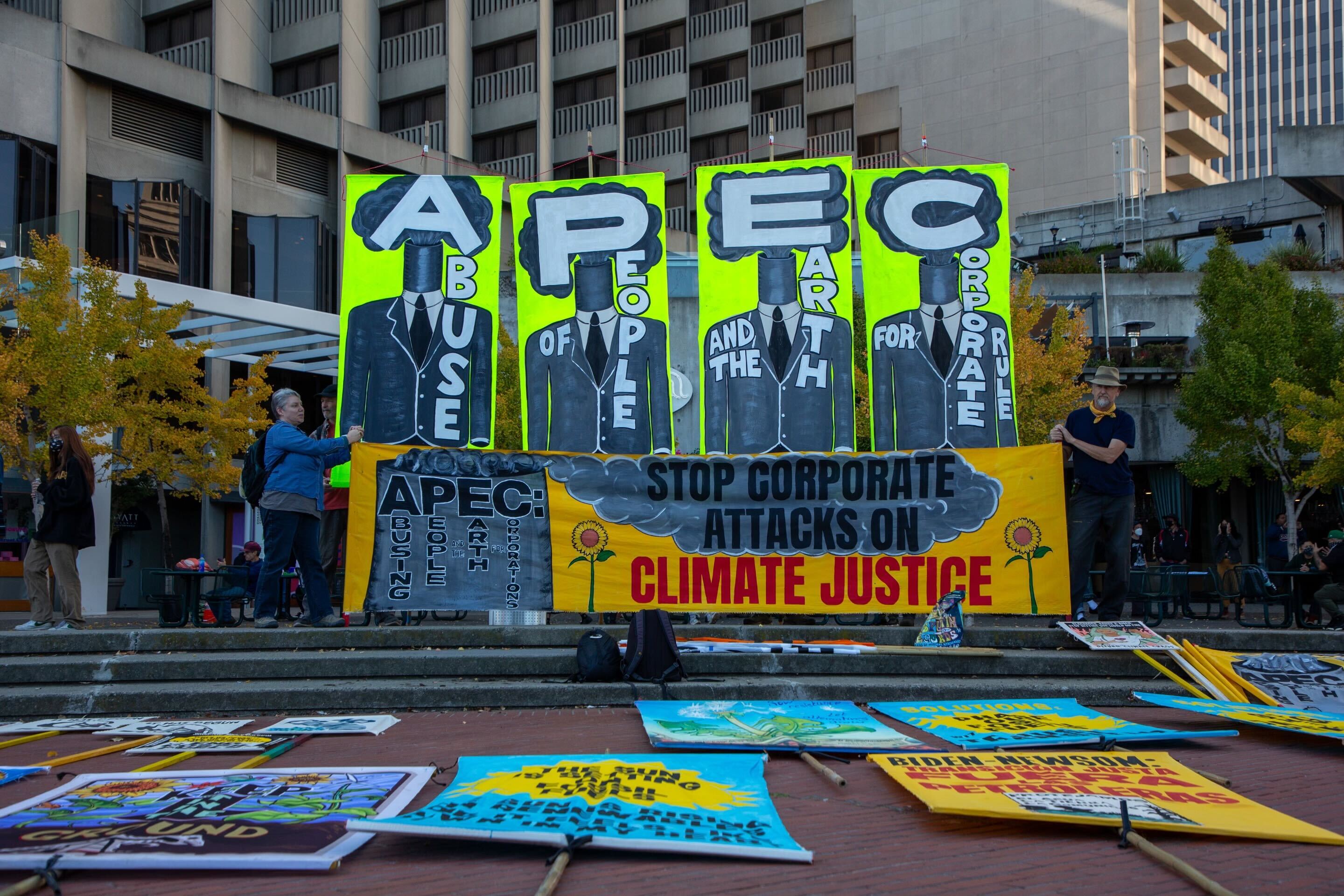Blocks away from the Moscone Center, which is hosting this week’s Asia-Pacific Economic Cooperation summit, workers at San Francisco startup Epic Cleantec poured beers made of recycled greywater from a San Francisco high-rise.
“More cities and more countries are looking at the model we’ve developed here as sort of a template for how they can sort of grow their own cities,” said Epic Cleantec CEO Aaron Tartakovsky, who led a tour of APEC attendees through his company, which turns wastewater into clean water, fertilizer and energy.
One of the key themes of the gathering—which has drawn world leaders from around the globe to San Francisco—is sustainability. Local companies are putting their best feet forward, hoping to use the opportunity to position the Bay Area, already a global technology industry epicenter, as a place for climate technology.
Tartakovsky will be speaking at a panel on sustainability at the event.
Just outside the security perimeter of the APEC CEO Summit, however, hundreds of protesters clashed with law enforcement as they aimed to disrupt the event in part due to what they call hypocrisy of having fossil fuel executives and major investors in the industry at an event purportedly focused on sustainability.
“Young people are very angry about the fact that world leaders are meeting, saying they’re talking about these topics. But at the end of proposals, their offers are greenwashed, watered-down,” said Will Wiltschko, an organizer with Bay Climate Action. “If you’re going to come up with policies on sustainability, it first needs to be a transparent process.”
A recent KQED report estimated that the heads of state flying into the event could produce around 31 million pounds of carbon equivalent emissions, more than a car driving from San Francisco to New York City 12,000 times.
ExxonMobil CEO Darren Woods was one of the first speakers featured on Wednesday morning for a talk on “Reframing the Climate Challenge.”
“When it comes to developing additional solutions beyond wind, solar and [electric vehicles], no one is investing more,” Woods said. “World-scale problems like climate change need world-scale companies to help solve them, like ExxonMobil.”
Addison Winslow, a Chico City Councilmember and anti-APEC activist, laid into the CEO Summit, calling it emblematic of wrong-headed approaches to sustainability.
“There are green investments that can be successful, and it’s absolutely important to promote that sort of thing happening,” Winslow said. “But you run into limits that capitalism does not accept.”
But the tacit hope among local startups is that the political agreements struck—and the technology discussed—will have broader environmental benefits, particularly if the companies are able to pitch their products to a global audience successfully.
Epic Cleantec’s initial market was largely created in part by a San Francisco program that requires buildings larger than 100,000 square feet to recycle water on-site. The company is poised for an expansion to cities like Los Angeles, Austin and New York City, as well as global centers.
“The rate at which we’re adding new buildings to our global building stock is like adding another New York City every month from now until 2050,” Tartakovsky said. “If we continue to just only build water and wastewater infrastructure the same way, we’re never going to be able to keep up.”
Other Bay Area cleantech companies putting their wares on display include San Francisco’s Charm Industrial, a startup turning agricultural “residues”—corn and cotton stalks, for instance—into carbon dioxide-filled bio-oil to be pumped underground.
The company set up a tour of its factory, located in an industrial part of San Francisco by lumber shops and restaurant supply stores, for APEC guests and media members.
Omer Davidi, the CEO of the Palo Alto-based startup BeeHero, has also been selected to speak at the summit. BeeHero’s AI-powered beekeeping technology sets up sensors inside beehives and provides a dashboard for farmers and beekeepers to keep tabs on bee colonies’ well-being.
Davidi spoke in a fireside chat that also included California Gov. Gavin Newsom and a former director of the United Nations’ World Food Programme. He said that his approach is meant to balance a profit-making enterprise with environmental concerns.
“It’s a combination of the innovative approach to an overlooked aspect [of agriculture] that also has a positive environmental impact,” Davidi said. “You can try and save the bees, but you also need to build a profitable business.”
Both Tartakovsky and Davidi hope that their business models will resonate with world leaders as they speak to a room full of them in the coming days.
The city, too, seems to be putting its hopes on APEC as a way to entrench San Francisco even further as a place of innovation. But the activists right outside the conference argue that real solutions to the climate crisis require a different approach.
“What real sustainability policy looks like is working groups with people from the community-centered,” said Wiltschko, the climate activist. “Building these kinds of working groups with people from actual communities, instead of billionaires.”
George Kelly contributed to this report.
